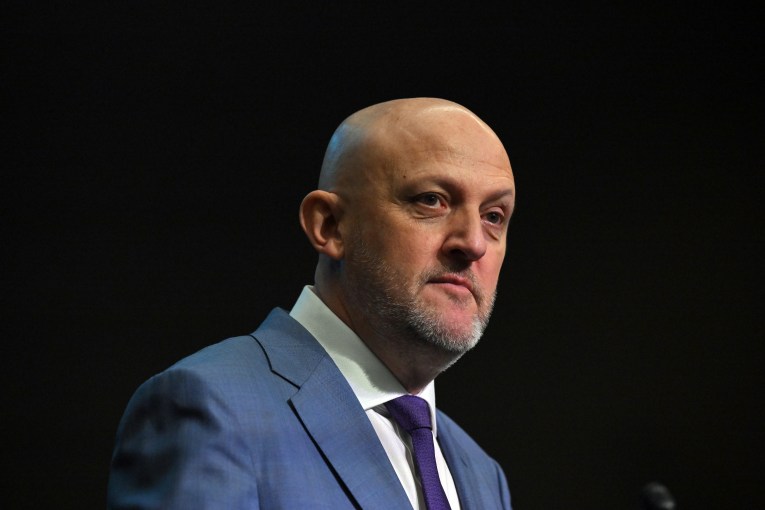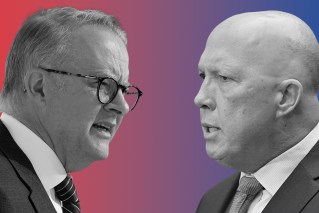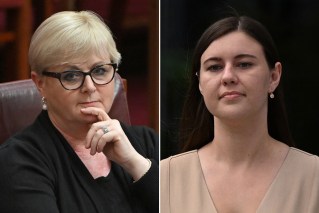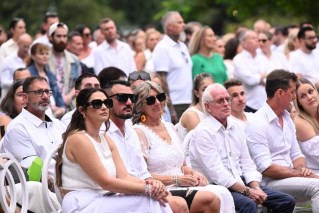Whether it’s a nuclear explosion, deadly plague or alien invasion, every great disaster movie begins with a scientist being ignored.
Dr Peter Hotez, an American infectious diseases expert from the Baylor College of Medicine, believes this film trope is playing out in real life.
And it’s threatening us all, including in Australia.
In an essay released on Friday, the esteemed scientist and author argues the rise of conspiracy theories and science denialism rival the coronavirus pandemic as a major public health threat.
Titled Anti-science kills: From Soviet embrace of pseudoscience to accelerated attacks on US biomedicine, Dr Hotez says the Trump administration organised a “campaign of disinformation” during the pandemic that contributed to the US’s staggering coronavirus death toll.
Examples of the White House’s “anti-science promotion efforts”, he claims, include promoting unproven COVID-19 cures, discrediting the effectiveness of face masks and downplaying the severity of the virus.
The politicisation of face masks led to the popularisation of new slogans like “health freedom” or “medical freedom”, he said, warning this trend will “likely have tragic consequences for the American people”.
Although the anti-science movement is much larger in the US than Australia, several high-profile Australians have been amplifying similar views during the coronavirus pandemic.
Look no further than conservative Australian MPs George Christensen and Craig Kelly, who have been slammed by scientists for repeatedly posting misinformation about the coronavirus on social media.
Mr Kelly’s posts include links to studies riddled with grammatical errors promoting COVID-19 “cures”, and claims that asking children to wear face masks is “child abuse”.

Federal MP Craig Kelly has shared unproven, unverified data and reports on coronavirus treatments and the effects of mask use. Photo: TND
His online activities have been described as “appalling” by vaccine expert Immunisation Coalition chief executive Kim Sampson.
“He should be pulled into shape, it’s just totally unacceptable for somebody with a national voice to be putting out that kind of misleading and abhorrent information,” he told NCA NewsWire.
“It shocks me when I read that kind of stuff and I really believe our prime minister needs to step up and put Craig Kelly in his place.”
It’s a disaster scenario we’ve seen before – and not only in movies like Contagion.
Dr Hotez pointed to the Great Purge in the 1930s, when Russian dictator Joseph Stalin ordered the mass jailing and executions of scientists, as “one of the darkest chapters in the history of the Soviet Union”.
In one incident highlighted by Dr Hotez, the work of Russian scientist Nikolai Vavilov, a botanist exploring new genetic approaches to improve cereal crops for the USSR, was undermined by a “peasant with no doctoral degree” called Trofim Lysenko.

Professor Nikolai Vavilov, AF Joffe and Nicholas Bukharin in London to attend the Congress of the History of Science, 1931. Photo: Getty
As a result, Professor Vavilov’s crucial findings were discarded as an “evil science” in exchange for Mr Lysenko’s unproven technology, which ultimately led to the deaths of millions of peasants by starvation.
In a cruel twist of irony, Professor Vavilov – who devoted his scientific career to the humanitarian cause of feeding the Soviet Union’s population – died of starvation in a Russian jail.

Stalin’s favourite scientist, Trofim Lysenko preached a version of genetics at odds with the real world, and caused the persecution of scientists who disagreed with him. Photo: Getty
“Although the exploitation of biomedical anti-science as a political instrument reached its darkest hour during the Great Purge, it did not end with Lysenko,” Dr Hotez writes.
He said online Russian vaccine disinformation made its way to the US and eventually ballooned into a fully fledged anti-vaccine movement in the 2000s, before accelerating with the help of “Russian bots and trolls” around 2014 before the US presidential election.
“It coincided with the anti-vaccine movement’s embrace of political extremism, especially on the right,” Dr Hotez writes.
This explosion of anti-science activities cloaked in right-wing rhetoric can be seen in conspiracy theories like QAnon, a pro-Trump group that believes COVID-19 is a hoax, among other baseless claims.

Members of the QAnon conspiracy group including Jake Angeli (Jacob Chansley), who stormed Capitol Hill over baseless claims of election fraud. Photo: Getty
The insurrection attempt on Capitol Hill, much of which was inspired by and organised on right-wing social media pages, shone the spotlight on how Australian authorities should respond to extremist political actors.
In December, the federal Parliament’s Joint Committee on Intelligence and Security (PJCIS) announced it would conduct a review into “extremist movements and radicalism in Australia”.
Police responded immediately after receiving tip-offs from several locals.
The incident highlights the growing threat of white nationalism in Australia – a trend that ASIO’s deputy director-general Heather Cook said was exacerbated by the coronavirus pandemic.
Speaking to a parliamentary committee last year, Ms Cook said the pandemic was fuelling a surge in radicalisation because “of the amount of time individuals are spending in isolation, working from home or not in school”.









